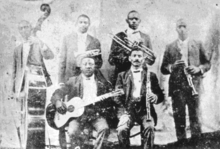Buddy Bolden
Buddy Bolden |
|---|
Charles "Buddy" Bolden (September 6, 1877 – November 4, 1931) was a African American cornetist and is regarded by contemporaries as a key figure in the development of a New Orleans style of rag-time music which later came to be known as jazz.
Life
He was known as King Bolden (see Jazz royalty), and his band was a top draw in New Orleans from about 1900 until 1907, when he was incapacitated by schizophrenia, which was called dementia praecox at that time. He left no known surviving recordings, but he was known for his very loud sound and constant improvisation.
While there is substantial first hand oral history about Buddy Bolden, facts about his life continue to be lost amongst colourful myth. Stories about him being a barber by trade or that he published a scandal-sheet called the Cricket have been repeated in print despite being debunked decades earlier.
Bolden suffered an episode of acute alcoholic psychosis in 1907. With the full diagnosis of dementia praecox, he was admitted to a mental institution where he spent the rest of his life.
Bolden was buried in an unmarked grave in Holt Cemetery, a pauper's graveyard in New Orleans. In 1998 a monument to Bolden was erected in Holt Cemetery, but his exact gravesite remains unknown.
Music

Many early jazz musicians credited Bolden and the members of his band with being the originators of what came to be known as "jazz", though the term was not yet in common musical use until after the era of Bolden's prominence. At least one writer has labelled him the father of jazz.[1] He is credited with creating a looser, more improvised version of ragtime and adding blues to it; Bolden's band was said to be the first to have brass instruments play the blues. He was also said to have taken ideas from gospel music heard in uptown African American Baptist churches.
Joe "King" Oliver, Freddie Keppard, Bunk Johnson, and other early New Orleans jazz musicians were directly inspired by his playing.
Although Bolden was recalled as having made at least one phonograph cylinder, no known recordings of Bolden have survived.
Some of the songs first associated with his band such as the traditional song Careless Love and My Bucket's Got a Hole in It, are still standards. Bolden often closed his shows with the original number "Get Out of Here and Go Home", although for more "polite" gigs the last number would be "Home Sweet Home".
One of the most famous Bolden numbers is a song called Funky Butt (known later as Buddy Bolden's Blues) which represents one of the earliest references to the concept of "funk" in popular music, now a musical subgenre unto itself. Bolden's Funky Butt was, as Danny Barker once put it, a reference to the olfactory effect of an auditorium packed full of sweaty people "dancing close together and belly rubbing." [2] Other musicians closer to Bolden's generation explained that the famous tune actually originated as a reference to flatulence.
I thought I heard Buddy Bolden say,
Funky-butt, funky-butt, take it away.
The "Funky Butt" song was one of many in the Bolden repertory with rude or off color lyrics popular in some of the rougher places Bolden played, and Bolden's trombonist Willy Cornish claimed authorship. It became so well known as a rude song that even whistling the melody on a public street was considered offensive. However the strain was incorporated into the early published ragtime number "St. Louis Tickle".
Bolden is the subject of a biography by Donald M. Marquis In Search Of Buddy Bolden: First Man Of Jazz, published by Louisiana State University Press in August 2005 (ISBN 0807130931).
Tributes to Bolden
Sidney Bechet wrote and composed "Buddy Bolden Stomp" in his honor.
Duke Ellington paid tribute to Bolden in his 1957 suite "A Drum is a Woman". The trumpet part was taken by Clark Terry.
Dr. John in the liner notes to his Goin' Back to New Orleans (1992) describes "I thought I heard Buddy Bolden say" (track 5) as "Jelly Roll Morton's memory of a jazz pioneer"
Bolden in fiction
Bolden has inspired a number of fictional characters with his name. Most famously, Canadian author Michael Ondaatje's novel Coming Through Slaughter features a Buddy Bolden character that in some ways resembles Bolden, but in other ways is deliberately contrary to what is known about him.
Bolden is also referenced in August Wilson's Seven Guitars. With a character (King Hedley) whose father, in the play, deliberately named him after King Buddy Bolden; with King Hedley constantly singing "I thought I heard Buddy Bolden say...;" and with King Hedley believing that Buddy Bolden will come down and bring him money to buy a plantation, Bolden is prominent in Wilson's drama.
Additionally, August Wilson's King Hedley II continues Seven Guitars, thus Bolden continues in the play as well.
Bolden is a prominent character in David Fulmer's murder mystery titled Chasing the Devil's Tail, being not only a bandleader but also a suspect in the murders. He also appears by reputation or in person in Fulmer's other books.
Bolden is the titular character in the film Bolden!, which is currently in production. He is being portrayed by Anthony Mackie.
Footnotes
- ^ Ted Gioia, The History of Jazz, Oxford/New York 1997, p. 34
2. Barker, Danny. 1998. Buddy Bolden and the Last Days of Storyville. New York: Continuum. p. 31.
Further reading
- In Search Of Buddy Bolden: First Man Of Jazz, by Donald M. Marquis. published by Louisiana State University Press. Second edition, August 2005 (ISBN 0807130931).
External links
- Buddy Bolden on National Public Radio
- Buddy Bolden's gravesite on findagrave.com
- Bolden! on IMDb.com
- Photograph [1]
- Photograph [2]
- Buddy Bolden's New Orleans Music [3]
